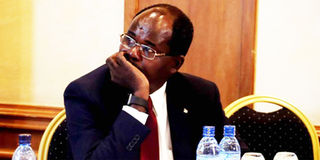Banks step up the push to have ceiling on interest rate lifted

Kenya Bankers Association CEO Habil Olaka on October 19, 2017 during a press conference on the Banking (Amendment) Act 2016. PHOTO | DIANA NGILA | NMG
What you need to know:
- The Kenya Bankers Association (KBA) released data showing that the flow of credit to individuals and small businesses had significantly dropped in the year to September.
- CEO Habil Olaka said a survey of the banking market had found that lending to borrowers, who are considered risky, has dropped as more banks choose to invest in government securities.
- Lending to the private sector had contracted on a month-on-month basis since the law came into effect, the KBA data shows, keeping the overall annual rate of credit growth at a low of 1.7 per cent at the end of September.
Kenya Bankers Association (KBA) has stepped up its campaign to have the law capping interest rates repealed with intense lobbying of parliamentarians to fast track the process.
The lobby, which represents all banks, Thursday released data showing that the flow of credit to individuals and small businesses had significantly dropped in the year to September.
Habil Olaka, the KBA chief executive, said a survey of the banking market had found that lending to borrowers, who are considered risky, has dropped as more banks choose to invest in government securities.
“Evidence has been provided by a number of stakeholders and we believe that evidence is pointing in one direction. We want the law repealed,” Mr Olaka said, adding that most lenders had decided that “they would rather be liquid than profitable hence the choice to expand their lending to government.”
Lending to the private sector had contracted on a month-on-month basis since the law came into effect, the KBA data shows, keeping the overall annual rate of credit growth at a low of 1.7 per cent at the end of September.
“Although the law came into effect when the rate of credit growth was already on the decline, month-on-month we are on a negative territory since its introduction,” Jared Osoro, KBA’s director of research and policy, said.
Mr Osoro said that the long electioneering period had also adversely affected banks as the market had not anticipated the extended period of intense politicking “where the election has sort of become a career.”
Kenya in September 2016 capped commercial lending rates at four percentage points above the 10 per cent central bank rate and imposed a minimum deposit rate of 70 per cent of the benchmark rate.
Patrick Njoroge, the Central Bank of Kenya governor, said last month that the rate cap law could be revised to allow banks a “free hand” in setting interest rates on loans, but in a better regulated environment.
He, however, did not disclose when this change is likely to happen.
“It is difficult to put a timeline because it is an engagement process that involves different players, including Parliament. We do not even have a committee yet and that will wait until we are done with the election,” Mr Olaka said.
Industry players expected the reversal journey to begin immediately after the August 8 General Election, but subsequent nullification of the presidential poll followed by a charged political environment has thrown those expectations off the track.
A number of banks have blamed the rate cap for their dismal performance this year, but the central bank’s June data showed that very little of the adverse effects could be attributed to the interest rate cap.
Data compiled by the Business Daily showed that earnings for 38 out 44 commercial banks fell 15.8 per cent to Sh140 billion in the first half 2016, setting the lenders up for lower profitability this year.
There has been a general slowdown in the economy this year occasioned by prolonged politicking after the presidential election was annulled by the Supreme Court on September 1.
A fresh election is scheduled for October 26.
KBA said the rate cap law did not take into consideration the fact that the banking industry had various facets such as real estate, which could not be regulated by a blanket law.
“We can no longer take the route where we tried to experiment with policy. Experimentation can be expensive,” Mr Olaka said.




